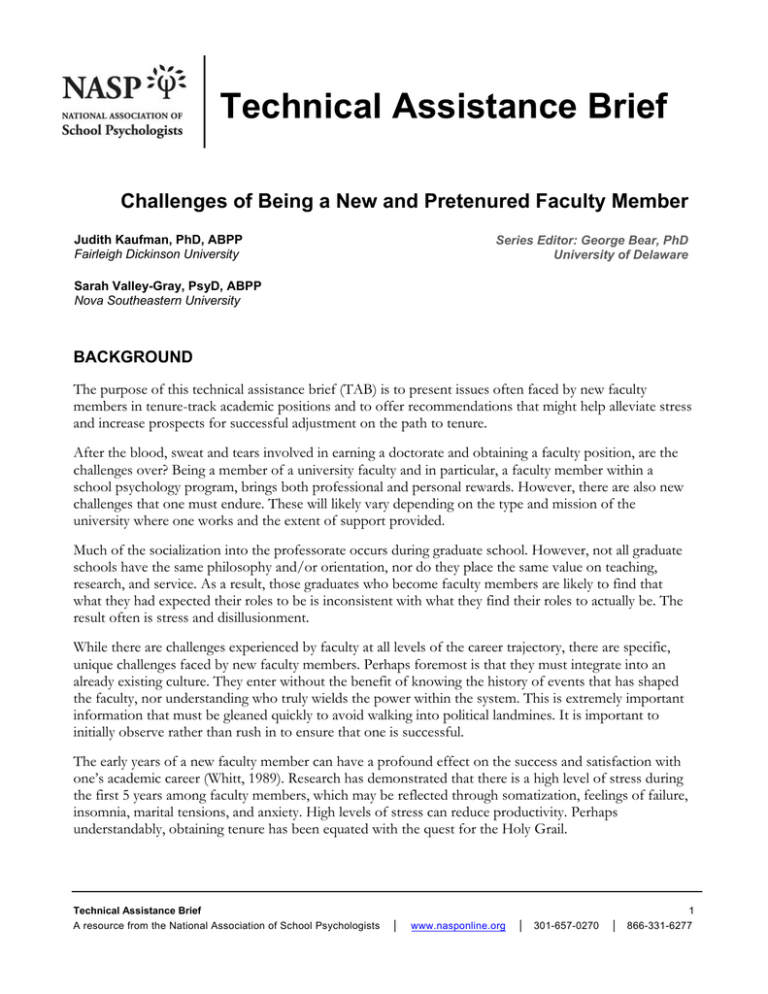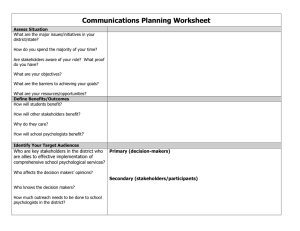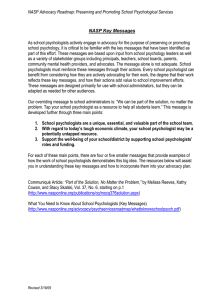Technical Assistance Brief BACKGROUND
advertisement

Technical Assistance Brief Challenges of Being a New and Pretenured Faculty Member Judith Kaufman, PhD, ABPP Fairleigh Dickinson University Series Editor: George Bear, PhD University of Delaware Sarah Valley-Gray, PsyD, ABPP Nova Southeastern University BACKGROUND The purpose of this technical assistance brief (TAB) is to present issues often faced by new faculty members in tenure-track academic positions and to offer recommendations that might help alleviate stress and increase prospects for successful adjustment on the path to tenure. After the blood, sweat and tears involved in earning a doctorate and obtaining a faculty position, are the challenges over? Being a member of a university faculty and in particular, a faculty member within a school psychology program, brings both professional and personal rewards. However, there are also new challenges that one must endure. These will likely vary depending on the type and mission of the university where one works and the extent of support provided. Much of the socialization into the professorate occurs during graduate school. However, not all graduate schools have the same philosophy and/or orientation, nor do they place the same value on teaching, research, and service. As a result, those graduates who become faculty members are likely to find that what they had expected their roles to be is inconsistent with what they find their roles to actually be. The result often is stress and disillusionment. While there are challenges experienced by faculty at all levels of the career trajectory, there are specific, unique challenges faced by new faculty members. Perhaps foremost is that they must integrate into an already existing culture. They enter without the benefit of knowing the history of events that has shaped the faculty, nor understanding who truly wields the power within the system. This is extremely important information that must be gleaned quickly to avoid walking into political landmines. It is important to initially observe rather than rush in to ensure that one is successful. The early years of a new faculty member can have a profound effect on the success and satisfaction with one’s academic career (Whitt, 1989). Research has demonstrated that there is a high level of stress during the first 5 years among faculty members, which may be reflected through somatization, feelings of failure, insomnia, marital tensions, and anxiety. High levels of stress can reduce productivity. Perhaps understandably, obtaining tenure has been equated with the quest for the Holy Grail. 1 Technical Assistance Brief A resource from the National Association of School Psychologists │ www.nasponline.org │ 301-657-0270 │ 866-331-6277 Challenges of Being a New and Pretenured Faculty Member Major stress-related themes that emerge from the literature include such variables as tenure standards being unknown and unknowable, a lack of community to support one’s efforts, and a lack of balance in the areas of professional and personal life (Rice, Sorcinelli, & Austin, 2000). The transition to being a new faculty member may be particularly difficult when one has to locate to a new area, adding the stress of needing to acculturate and establish a social network. However, even remaining in the same area, acculturation from being a graduate student to becoming a faculty member is a challenging developmental transition. Katz and Kahn’s (1978) seminal organizational stress theory delineates important issues that must be considered when transitioning to a new role. They include role ambiguity (uncertainty of expectations), role conflict (role expectations are incompatible or contradictory), and, finally, role overload (more is expected than one can accomplish). Research has indicated that most tenure-track faculty members experience some degree of ambiguity regarding role expectations in their journey toward obtaining tenure. RECOMMENDATIONS FOR NEW FACULTY Strive to balance your personal and professional lives. This is often difficult, especially when you are also a parent. It helps to share home and childrearing responsibilities with your partner. It also helps to schedule regular times at home for writing to ensure that you are moving toward your publication goals. Finding other individuals who are struggling to balance parenthood with their careers also might provide support. Identify ways to cope with the initial isolation involved in entering a new system. Consider engaging in university-wide activities and committees to develop relationships both inside and outside of your department. Consider volunteering to serve on professional association boards in school psychology, such as your state school psychology association, or national groups such as the National Association of School Psychologists (NASP) or the American Psychological Association (APA). Attend national meetings of graduate educator colleagues from across the country, such as those sponsored by the Trainers of School Psychologists (TSP), the Council of Directors of School Psychology Programs (CDSPP), or NASP’s Graduate Education Committee. The networking opportunities offered by participation in these meetings, as well as the social events, are invaluable and allow you to connect with colleagues from similar and dissimilar institutions so that you can build a network of support. In addition, all of these experiences will help you to build your curriculum vitae in the area of service and will potentially lead to opportunities for collaboration in the areas of research and teaching. Have both early and ongoing meetings with faculty colleagues in your department to determine both the overt and covert expectations in the areas of teaching, research (or scholarship), and service. Although you would have discussed expectations in those areas with some faculty members and administrators before being hired, be aware that expectations in those areas might be viewed differently by others, and they might change. For example, at a research university, “teaching, research, and service” might be interpreted by others as “RESEARCH, teaching, and some service.” If publications are important for tenure, learn quickly what counts and is weighed most heavily come time for tenure. For example, it might not be clear in Promotion and Tenure Guidelines if book chapters or articles in Communiqué are viewed differently than research articles in peer-reviewed journals, or if journals must have high impact ratings. If you learn quickly that service is valued much less than research and teaching, you also might want to learn how to say “no” to time-consuming service (where feasible and wise to do so). 2 Technical Assistance Brief A resource from the National Association of School Psychologists │ www.nasponline.org │ 301-657-0270 │ 866-331-6277 Challenges of Being a New and Pretenured Faculty Member Ask for clarity regarding expectations, especially when you sense that your own standards might differ from those in the university or college Promotion and Tenure Guidelines or from the views of others in the department. Strive to develop working relationships with all members of your program, which will likely help not only in the areas of teaching, research, and service, but also in developing and negotiating your role in the program. This also is vital in knowing or anticipating their opinions on important matters, including tenure. Be sure to include those who might be most critical! Collaborate with senior faculty members, particularly those with similar research interests. When you do so, maintain records regarding where in the process you are with each of your research/writing projects, including the submission history. This will allow you to prioritize which project to work on and when. Find a mentor! While many departments will assign a mentor, the individual may or may not be a good fit for you. This mentor can be in your department, your university, or across the country. New faculty, particularly those replacing retiring faculty, are often expected to do much more than their predecessors. Be prepared for every class. Preparation should include talking with colleagues who have taught the course previously. Obtain copies of syllabi from faculty in your department and reach out to the school psychology community for additional guidance on course content and teaching strategies (e.g., use the SPTRAIN Listserv). Division 2 of the American Psychological Association (Teaching of Psychology) has a number of peer-reviewed syllabi and other resources that can be of support. Engage in reflective teaching. For example, after each class session, consider what was effective and how you might improve your teaching style for the next class session and the next time you teach the course. Obtain feedback from your students throughout the semester rather than at the end when it is too late to make any changes for the current semester. Be sure to make note of what you have learned so that these changes can be implemented the next time you teach the course. Recognize that there is significant variability both within and across training programs with regards to student skills, student motivation, and classroom management (even at the graduate level!). To respond to such teaching challenges, be prepared by discussing related issues with other faculty members, such as course expectations and grading. Academic life can bring many stressors and challenges. However, the positive professional and personal rewards outweigh the potential negatives. This is particularly true in being involved in professional training. Meeting a former student who says to you, “I couldn’t have done this without you,” is the reward in and of itself! REFERENCES Austin, A. E. (2002). Preparing the next generation of faculty. The Journal of Higher Education, 1(January/February), 94–123. Hill, N. R. (2004). The challenges experienced by pretenured faculty members in counselor education: A wellness perspective. Counselor Education and Supervision, 44(2), 135–146. Katz, D., & Kahn, R. L. (1978). The social psychology of organizations (2nd ed.). New York, NY: Wiley. Malone, R. J. (2002). Tenure-track faculty socialization: The presence and effects of role ambiguity, role conflict and role overload. Unpublished doctoral dissertation. University of Maryland. UMI 3078325. 3 Technical Assistance Brief A resource from the National Association of School Psychologists │ www.nasponline.org │ 301-657-0270 │ 866-331-6277 Challenges of Being a New and Pretenured Faculty Member Menges, R. J. (1996). Experiences of newly hired faculty. In Richlin, L. (Ed.), To Improve the Academy, Volume 15, 169–182. Rice, R. E., Sorcinellli, M. D., & Austin, A. E. (2000). Heeding new voices: Academic careers for a new generation (New Pathways Working Paper No. 7). Washington, DC: American Association for Higher Education. Developed by the Technical Assistance Group of the NASP Graduate Education Workgroup © 2016, National Association of School Psychologists, 4340 East West Highway, Suite 402, Bethesda, MD 20814, 301-657-0270, www.nasponline.org Please cite this document as: Kaufman, J., & Valley-Gray, S. (2016). Challenges of Being a New and Pretenured Faculty Member [Technical assistance brief]. Bethesda, MD: National Association of School Psychologists. 4 Technical Assistance Brief A resource from the National Association of School Psychologists │ www.nasponline.org │ 301-657-0270 │ 866-331-6277

![[Today’s Date] [Your Supervisor’s First Name] [Your School or District’s Name]](http://s2.studylib.net/store/data/010451343_1-ed5410b4013e6d3fbc1a9bbd91a926a9-300x300.png)


